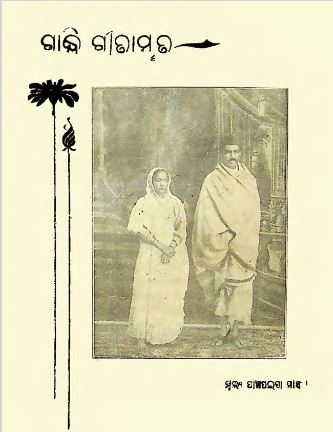Gandhi Gitamrut published in 1921, stands as a timeless testament to the poetic tribute paid to Mahatma Gandhi, the revered leader of India’s independence movement. This Odia poetry book, authored by a talented poet whose name has unfortunately not been widely documented, encapsulates the spirit, ideals, and profound impact of Mahatma Gandhi’s philosophy on the Indian nation during its struggle for freedom from British colonial rule.
The year 1921 marked a crucial juncture in India’s history, with Mahatma Gandhi emerging as a prominent leader through his nonviolent civil disobedience campaigns and advocacy for social justice and equality. The poetry collection “Gandhi Gitamrut” serves not only as a literary endeavor but also as a powerful expression of solidarity and reverence for Gandhi’s transformative leadership.
The poems in “Gandhi Gitamrut” are imbued with themes that resonate deeply with Gandhi’s philosophy, such as truth (satya), nonviolence (ahimsa), self-discipline (tapasya), and social harmony. Through lyrical verses and evocative imagery, the poet celebrates Gandhi’s unwavering commitment to justice and his ability to mobilize masses through peaceful resistance. Each poem serves as a lyrical tribute, weaving together Gandhi’s life experiences, teachings, and vision for a liberated India.
The poet’s craftsmanship is evident in the eloquent portrayal of Gandhi’s persona — his humility, compassion, and indomitable spirit. Poetic devices such as metaphor, symbolism, and allegory are employed to evoke emotional resonance and illuminate Gandhi’s profound impact on the Indian psyche. The verses capture pivotal moments of Gandhi’s life, from his transformative years in South Africa to his leadership of the Indian National Congress and the Salt March to Dandi, highlighting his role as a beacon of hope and inspiration.
Moreover, “Gandhi Gitamrut” transcends its role as a literary work to become a cultural artifact and a historical document. It offers contemporary readers a window into the ethos of the Indian freedom struggle and the reverence accorded to Gandhi as the Mahatma (Great Soul) by poets and intellectuals of his time. The publication of the book in 1921 underscores the immediate and profound impact Gandhi had on the Indian intelligentsia and cultural milieu, inspiring creative expressions that sought to galvanize public support for the national movement.
In conclusion, “Gandhi Gitamrut” remains a poignant and significant contribution to Odia poetry and Indian literature at large. Its verses continue to resonate with readers, offering insights into Gandhi’s transformative leadership and his enduring legacy as the Father of the Nation. As a literary homage, the book enriches our understanding of Gandhi’s principles and ideals, serving as a reminder of the power of literature to inspire social change and uphold the values of truth, nonviolence, and justice.
Books Info
| Books name | Gandhi Gitamrut/ଗାନ୍ଧି ଗୀତାମୃତ |
| Author | NA |
| No Of pages | 18 |
| Publisher | Kusumita Publication |
| Publication | 1921 |
| Printed At | Print Art |
| Distributor | NA |

